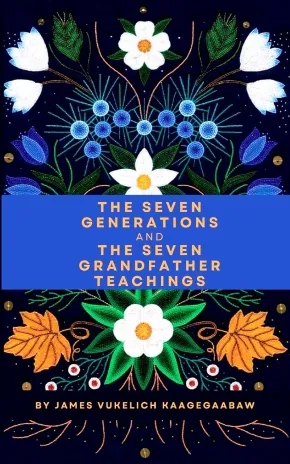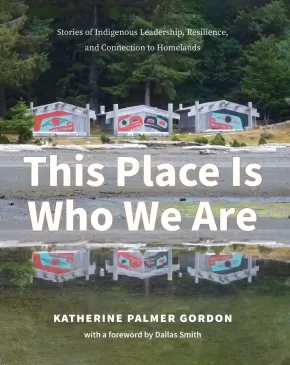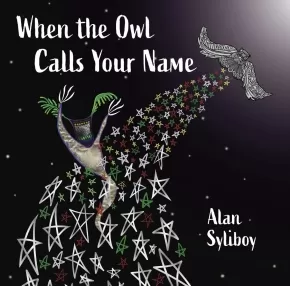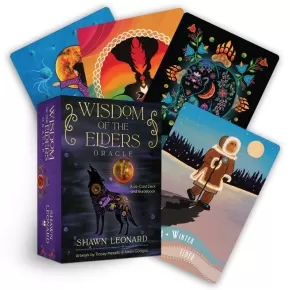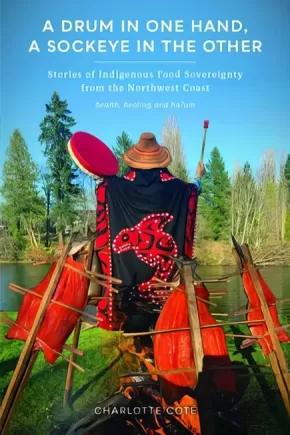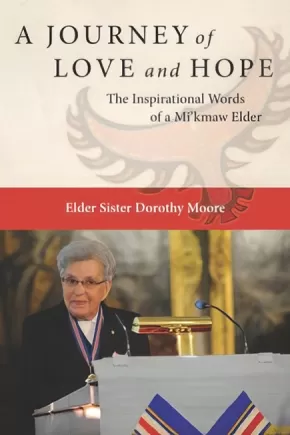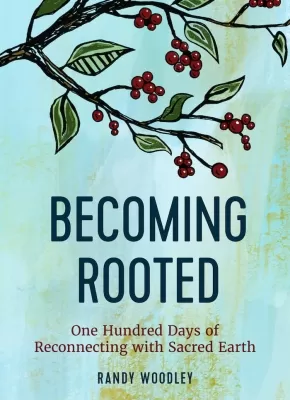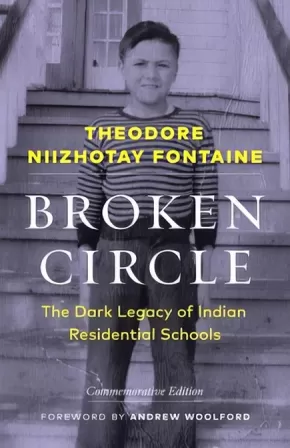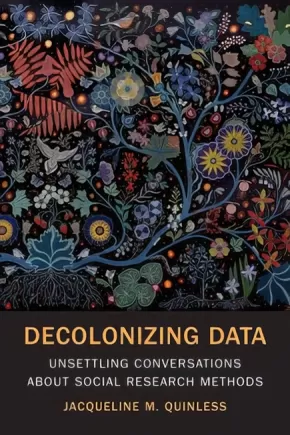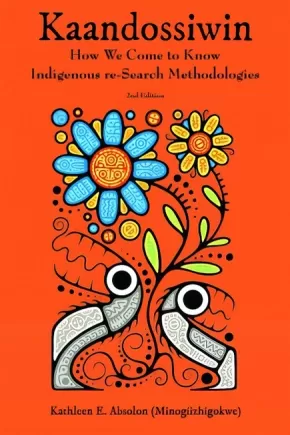
Healing and Wellness
76
-
90
of
303 Results;
Sort By
Go To
of 21
The Seven Generations and The Seven Grandfather Teachings
$18.50
Format:
Paperback
Text Content Territories:
Indigenous American; Native American; Anishinaabeg; Ojibwe (Chippewa);
Reading Level: N/A
ISBN / Barcode: 9798988531302
Synopsis:
Synopsis:
Discover the profound wisdom of the Anishinaabe/Ojibwe people in The Seven Generations and The Seven Grandfather Teachings. In this captivating journey, you will immerse yourself in timeless teachings that illuminate the way to interconnectedness and interdependence. As the spiritual translation of the sacred laws, the Seven Grandfather teachings guide us towards Mino-bimaadiziwin, 'the good life' - a life of harmony, free from contradiction or conflict. Prepare to embark on a transformative path of peace and balance, where ancestral knowledge offers invaluable lessons for a fulfilling existence.
Additional Information
90 pages | 5.00" x 8.00" | Paperback
This Place Is Who We Are: Stories of Indigenous Leadership, Resilience, and Connection to Homelands
$39.95
Format:
Paperback
Text Content Territories:
Indigenous Canadian; First Nations; Kwakwaka'wakw (Kwakiutl); Ligwilda'wx (Laich-kwil-tach); Wei Wai Kai Nation; Dzwada’enuxw; Haida; Nuxalk (Bella Coola);
Reading Level: N/A
ISBN / Barcode: 9781990776137
Synopsis:
Synopsis:
This Place Is Who We Are profiles Indigenous communities in central and northern coastal BC that are reconnecting to their lands and waters—and growing and thriving through this reconnection.
Indigenous peoples and cultures are integrally connected to the land. Well-being in every sense—physical, social, environmental, economic, spiritual and cultural—depends on that relationship, which is based on a fundamental concept: when the land is well, so are the people.
With increasing strength, Indigenous peoples in this vast region of BC—which spans the homelands of more than two dozen First Nations and one of the largest remaining coastal temperate rainforests in the world—are restoring what has been lost through environmental depredation and healing what has been devastated by colonization.
This volume is a collection of ten of these inspiring stories. X̱aayda voices explain how their Rediscovery camps are healing and empowering their youth; Dzawada̱’enuxw Hereditary Chief Maxwiyalidizi K’odi Nelson shares the story of building a healing centre and ecolodge; Wei Wai Kum Chief Christopher Roberts describes the challenges and opportunities for an urban First Nation looking to prosper while protecting the environment and ancient Ligʷiłdaxʷ history and living cultural values; and many more Indigenous leaders share their own experiences of growth, strength and reconnection.
Thoughtful and inspiring, This Place Is Who We Are illustrates what can be accomplished when conservation and stewardship are inextricably intertwined with the prosperity and well-being of communities.
Reviews
“Katherine Palmer Gordon, a consummate listener, weaves a powerful tapestry of ten First Nations people, deeply grounded in land, memory and story. Their lives honour the inextinguishable inter-connectedness of humans and nature, in righteous defiance of colonization. These are stories that point to an optimistic future based on the teachings of Ancestors and Elders with a view to making the world better for children, grandchildren and children yet to come. To do this, human wellbeing and land protection must be inseparable. This book is an encounter with wonderful people doing wonderful things. This Place is Who We Are is an invitation to hope for a better society, a better world, featuring ten people creating it. I thank the contributors and Katherine Palmer Gordon for engaging in a visionary conversation.” — Shelagh Rogers, O.C. Host/Producer of The Next Chapter, CBC Radio One, Honorary Witness, Trut
“A beautiful collection of stories and lived experiences! Each with gentle and loving reminders of our sacred connections to each other, the land and water and all living beings. Individually, these stories are inspiring, hopeful and thought provoking. As a collection, majestically woven together by Katherine Palmer Gordon, they have the potential to change hearts and minds of readers, decision makers and future generations.” — Monique Gray Smith
“An astute facilitator of Indigenous governmental relationships and reconciliation, Katherine Palmer Gordon is also an award-winning writer, and a very good listener who earns trust. These deeply personal accounts of Indigenous cultural rediscovery, empowerment—and healing in a post-colonial world—are truly inspiring. Steeped in ancient connections with the land, the shared wisdom and vision of elders, youth and community leaders offer timely lessons for a healthier, more respectful relationship between people, wildlife and our planet. This is good medicine for all.” — Mark Forsythe, Co-author of The Trail of 1858: British Columbia's Gold Rush Past and former C
“Katherine Palmer Gordon, a consummate listener, weaves a powerful tapestry of ten First Nations people, deeply grounded in land, memory and story. Their lives honour the inextinguishable inter-connectedness of humans and nature, in righteous defiance of colonization. These are stories that point to an optimistic future based on the teachings of Ancestors and Elders with a view to making the world better for children, grandchildren and children yet to come. To do this, human wellbeing and land protection must be inseparable. This book is an encounter with wonderful people doing wonderful things. This Place is Who We Are is an invitation to hope for a better society, a better world, featuring ten people creating it. I thank the contributors and Katherine Palmer Gordon for engaging in a visionary conversation.” — Shelagh Rogers, O.C. Host/Producer of The Next Chapter, CBC Radio One, Honorary Witness, Trut
“A beautiful collection of stories and lived experiences! Each with gentle and loving reminders of our sacred connections to each other, the land and water and all living beings. Individually, these stories are inspiring, hopeful and thought provoking. As a collection, majestically woven together by Katherine Palmer Gordon, they have the potential to change hearts and minds of readers, decision makers and future generations.” — Monique Gray Smith
“An astute facilitator of Indigenous governmental relationships and reconciliation, Katherine Palmer Gordon is also an award-winning writer, and a very good listener who earns trust. These deeply personal accounts of Indigenous cultural rediscovery, empowerment—and healing in a post-colonial world—are truly inspiring. Steeped in ancient connections with the land, the shared wisdom and vision of elders, youth and community leaders offer timely lessons for a healthier, more respectful relationship between people, wildlife and our planet. This is good medicine for all.” — Mark Forsythe, Co-author of The Trail of 1858: British Columbia's Gold Rush Past and former C
Additional Information
256 pages | 8.00" x 10.00" | Paperback
256 pages | 8.00" x 10.00" | Paperback
Truth and Reconciliation Through Education: Stories of Decolonizing Practices (Pratt)
$39.95
Editors:
Format:
Paperback
Text Content Territories:
Indigenous Canadian;
Reading Level: N/A
ISBN / Barcode: 9781550599336
Synopsis:
Synopsis:
How educators can respond to the Truth and Reconciliation Commission’s Calls to Action
Educators have a special role in furthering truth and reconciliation practices in education, but many struggle to understand exactly what that means and how to accomplish it. Reconciliation through education is grounded in the amplification of Indigenous voices as the spark of authentic reconciliatory practices, as well as the understanding that everyone can gain insights through reconciliation practices and relationships.
Springing from a master’s certificate program at the University of Calgary called Indigenous Education: A Call to Action, this book explores stories from alumni, program designers, and instructors who have taken a deliberate and active role in responding to the TRC’s Calls to Action through education. Section I contains useful chapters on program design and concepts, while section II presents a collection of inspirational and thought-provoking personal stories and reflections from Indigenous and non-Indigenous educators.
This is a resource written by educators for educators wishing to embark on their own journeys of truth and reconciliation in their personal and professional lives. Join the reconciliatory education community in courageously teaching, learning, and acting, just as the educators in this collected volume are doing.
Additional Information
240 pages | 6.00" x 9.00" | Paperback
When the Owl Calls Your Name
$22.95
Artists:
Format:
Hardcover
Text Content Territories:
Indigenous Canadian; First Nations; Mi'kmaq;
ISBN / Barcode: 9781774712467
Synopsis:
Synopsis:
"The Owl Song" by Alan Syliboy & the Thundermakers is now a gorgeously illustrated book for all ages, exploring Mi'kmaw spirituality, life and death.
They say when the Owl calls your name
that the Creator is calling you home.
And when the owl comes to you,
he sits and waits until your final breath.
Then your journey begins.
From bestselling author Alan Syliboy (Mi'kmaw Daily Drum, Wolverine and Little Thunder, The Thundermaker) comes a beautiful new book exploring spirituality, mortality and grieving. An illustrated extended version of his popular song "The Owl Song," it features imagery inspired by his band Alan Syliboy & The Thundermakers' performance material and an author's note on Mi'kmaw tradition and Syliboy's own personal experiences with death. This book for all ages is a poignant depiction of what might happen when the Owl calls your name, and you begin your journey home to the ancestors.
Educator Information
The publisher recommends this picture book for all ages.
Subjects: death, grief, afterlife, spiritual, Mi'kmaw tradition
Additional Information
32 pages | 8.00" x 8.00" | Hardcover
Wisdom of the Elders Oracle: A 44-Card Deck and Guidebook
$28.99
Artists:
Text Content Territories:
Indigenous American; Native American; Mi'kmaq;
Reading Level: N/A
ISBN / Barcode: 9781401971755
Synopsis:
Synopsis:
A 44-card oracle deck focusing on the teachings, traditions, and wisdom of the Mi’kmaq people, meant to help the reader create a deeper connection with the spirit world and Mother Earth.
Indigenous wisdom is sacred and has been shared for many generations by the Elders of the spirit world, and it is through their wisdom that we bridge the physical world to the spirit world. When you use these oracle cards you are walking in the world with the wisdom of the Elders. These teachings were meant to be shared with you, and to help you through your daily and spiritual life.
This deck is a tool meant to support you on your journey through life; the purpose of sharing these teachings is to help you grow and develop spiritually, within your own personal connection to Spirit, and to your loved ones on the other side.
The cards include—but are not limited to—teachings and concepts like:
Indigenous wisdom is sacred and has been shared for many generations by the Elders of the spirit world, and it is through their wisdom that we bridge the physical world to the spirit world. When you use these oracle cards you are walking in the world with the wisdom of the Elders. These teachings were meant to be shared with you, and to help you through your daily and spiritual life.
This deck is a tool meant to support you on your journey through life; the purpose of sharing these teachings is to help you grow and develop spiritually, within your own personal connection to Spirit, and to your loved ones on the other side.
The cards include—but are not limited to—teachings and concepts like:
- the Seven Grandfather Teachings
- the Four Sacred Fire Teachings
- the Four Sacred Medicines
- the Milky Way
- Talking Circle
- Two-Spirit
- Spirit Totem Animal
- Power Totem Animal
- Wigwam.
Additional Information
120 pages | 3.94" x 5.44" | 44-Card Deck and Guidebook
A Drum in One Hand, a Sockeye in the Other: Stories of Indigenous Food Sovereignty from the Northwest Coast
$41.00
Format:
Paperback
Text Content Territories:
Indigenous Canadian; First Nations; Nuu-chah-nulth (Nootka); Tseshaht First Nation;
Grade Levels: 12; University/College;
ISBN / Barcode: 9780295749525
Synopsis:
Synopsis:
In the dense rainforest of the west coast of Vancouver Island, the Somass River (c̓uumaʕas) brings sockeye salmon (miʕaat) into the Nuu-chah-nulth community of Tseshaht. C̓uumaʕas and miʕaat are central to the sacred food practices that have been a crucial part of the Indigenous community’s efforts to enact food sovereignty, decolonize their diet, and preserve their ancestral knowledge.
In A Drum in One Hand, a Sockeye in the Other, Charlotte Coté shares contemporary Nuu-chah-nulth practices of traditional food revitalization in the context of broader efforts to re-Indigenize contemporary diets on the Northwest Coast. Coté offers evocative stories of her Tseshaht community’s and her own work to revitalize relationships to haʔum (traditional food) as a way to nurture health and wellness. As Indigenous peoples continue to face food insecurity due to ongoing inequality, environmental degradation, and the Westernization of traditional diets, Coté foregrounds healing and cultural sustenance via everyday enactments of food sovereignty: berry picking, salmon fishing, and building a community garden on reclaimed residential school grounds. This book is for everyone concerned about the major role food plays in physical, emotional, and spiritual wellness.
Reviews
"A powerful philosophy of food sovereignty. Coté successfully navigates myriad scholarly and nonscholarly voices, telling a compelling comprehensive story that helps us understand the practices and policies needed to make change in our food systems." — Kyle Whyte, Michigan State University
"Adeptly uses a deep storytelling method, including both lived experience and critical analysis of history and theory, to examine experiences and transformations of Indigenous foodways." — Hannah Wittman, University of British Columbia
"I am so grateful for Charlotte Cote’s A Drum in One Hand, a Sockeye in the Other, which creates a path into the living foodways and thoughtways of her people. Her warm, storytelling voice and sharing of collective knowledge embody the generous spirit of a feast, and this book itself, is a feast." — Robin Wall Kimmerer (Potawatomi), SUNY Environmental Science and Forestry
Additional Information
208 pages | 6.00" x 9.00" | 17 b&w illustrations | 2 maps | Paperback
A Journey of Love and Hope: The Inspirational Words of a Mi'kmaw Elder
$24.95
Artists:
Format:
Hardcover
Text Content Territories:
Indigenous Canadian; First Nations; Mi'kmaq;
Reading Level: N/A
ISBN / Barcode: 9781774711187
Synopsis:
Synopsis:
The long-awaited collection of talks, presentations, prayers, and ceremonies of renowned Mi'kmaw Elder, human rights activist, and language and culture warrior, Sister Dorothy Moore.
Mi'kmaw Elder Sister Dorothy Moore has spent a lifetime advocating for the rights of her people. As a well-known educator and a survivor of the Shubenacadie Indian Residential School, she has broken down systemic barriers, leading the Mi'kmaq to access all levels of education, and worked tirelessly to reclaim and promote Indigenous ways of knowing and being.
In A Journey of Love and Hope, Sister Dorothy's words are collected in print, as she originally spoke them, for the first time. Included are speeches, talks, presentations, and ceremonies delivered between 1985 and 2015 to universities, government departments, and Indigenous organizations and gatherings. Thematic sections include Culture and Language, Spirituality, Racism, Education, and Prayers and Ceremonies, framed by Ikantek (introductions) from well-known Mi'kmaw writers and educators, as well as an Associate Sister of the Sisters of St Martha.
Sister Dorothy's talks and presentations will inspire and serve to disrupt the dominant narratives of complex Indigenous issues such as colonialism, oppression, racism, and discrimination. A Journey of Love and Hope gives a voice to Mi'kmaw lived experiences and provides a valuable resource for use in schools, postsecondary education institutions, and communities. Her words are an inspiration to all Treaty people.
Features original illustrations by celebrated Mi'kmaw artist Gerald Gloade and appendices, including a complete list of Sister Moore's talks and presentations and a timeline of life events.
Additional Information
184 pages | 6.00" x 9.00" | Hardcover | Colour photo insert
Amplifying Indigenous Voices in Business: Indigenization, Reconciliation, and Entrepreneurship
$26.95
Format:
Paperback
Text Content Territories:
Indigenous Canadian;
Reading Level: N/A
ISBN / Barcode: 9781770403406
Synopsis:
Synopsis:
Indigenization is more than reconciliation: It is a better business practice!
Some of the common questions businesses, educational institutions, and communities ask are: “Do we need an Indigenization strategy? If so, why; what is it really?; and, how do we do it?”
Amplifying Indigenous Voices in Business is for organizations and allies who would like to make a positive difference by learning how to amplify Indigenous voices, Indigenize businesses, and support Indigenous entrepreneurship, all in the bigger spirit of reconciliation.
Author Priscilla Omulo addresses Canada’s complicated history with Indigenous peoples and how that contributes to today’s challenges in the business realm. While the challenge is real, so is the opportunity, and Omulo’s step-by-step guide explains how any organization can make immediate plans to improve the way they do business by doing the research, consulting the right people, and formulating a strategy to move forward. Omulo shows readers how a commitment to doing the right thing will lead to a more sustainable and inclusive place for all, and a stronger foundation for businesses and other organizations.
Additional Information
152 pages | 6.00" x 9.00" | Paperback
Becoming Rooted: One Hundred Days of Reconnecting with Sacred Earth
$29.99
Format:
Hardcover
Text Content Territories:
Indigenous American; Native American; Cherokee; United Keetoowah Band ;
Reading Level: N/A
ISBN / Barcode: 9781506471174
Synopsis:
Synopsis:
What does it mean to become rooted in the land? How can we become better relatives to our greatest teacher, the Earth? Becoming Rooted invites us to live out a deeply spiritual relationship with the whole community of creation and with Creator.
Through meditations and ideas for reflection and action, Randy Woodley, an activist, author, scholar, and Cherokee descendant, recognized by the Keetoowah Band, guides us on a one-hundred-day journey to reconnect with the Earth. Woodley invites us to come away from the American dream--otherwise known as an Indigenous nightmare--and get in touch with the water, land, plants, and creatures around us, with the people who lived on that land for thousands of years prior to Europeans' arrival, and with ourselves. In walking toward the harmony way, we honor balance, wholeness, and connection.
Creation is always teaching us. Our task is to look, and to listen, and to live well. She is teaching us now.
"This journey is your personal invitation into a different kind of relationship with nature—or, as I like to say, with the whole community of creation. It is also an invitation into a different kind of relationship with Creator, however you understand Creator to be present in your own life and within everything—as God, as Great Mystery, as a higher power, or as the universe." - Randy Woodley
Reviews
“Randy Woodley reminds us that we all have an understanding of what it means to be indigenous to a spiritual place. Through slowly unfolding layers of meaning, he shows us where we may discover that place for ourselves.”—Steven Charleston, elder of the Choctaw Nation of Oklahoma
“Becoming Rooted offers us a precious way back into the land: a way into restoration and reciprocity, a way into healing ourselves and the land, a way of belonging again, a way of finding out who we are. Randy Woodley takes us by the hand and walks with us for the first one hundred days. We begin to think and feel differently, our senses gain new direction, and we start to gain roots. I am so grateful for this book and for the life and work of Randy Woodley.”— Cláudio Carvalhaes, associate professor of worship, Union Theological Seminary
“Becoming Rooted draws you deeper into relationship with the land where you live. Few of us live in the place we were born, but these reflections take you past that disconnection and help you notice the world around you in new ways.”—Patty Krawec, Anishnaabe author and co-host of the Medicine for the Resistance podcast
Educator Information
Includes meditations, reflections, and action items for 100 days.
Additional Information
256 pages | 5.20" x 7.10" | Hardcover
Braided Learning: Illuminating Indigenous Presence through Art and Story
$29.95
Format:
Paperback
Text Content Territories:
Indigenous Canadian; First Nations; Inuit; Métis;
ISBN / Barcode: 9780774880794
Synopsis:
Synopsis:
The Truth and Reconciliation Commission and Indigenous activism have made many non-Indigenous Canadians uncomfortably aware of how little they know about First Nations, Métis, and Inuit peoples. In Braided Learning, Susan Dion shares her approach to engaging with Indigenous histories and perspectives. Using the power of stories and artwork, Dion offers respectful ways to learn from and teach about challenging topics including settler-colonialism, treaties, the Indian Act, residential schools, and the Sixties Scoop. Informed by Indigenous pedagogy, Braided Learning draws on Indigenous knowledge to make sense of a difficult past, decode unjust conditions in the present, and work toward a more equitable future.
This book is a must-read for teachers and education students. It should also be read by students and practitioners in social work, child and youth counselling, policing, and nursing, or anyone seeking a foundational understanding of the histories of Indigenous peoples and of settler colonialism in Canada.
Reviews
“This book should be in every educator’s library. It serves as a model for educators to learn and teach about the history of Indigenous peoples and settler colonialism without fear or reservation. It is exactly what has been asked for over and over again.”— Tracey Laverty, First Nations, Inuit and Métis Education, Saskatoon Public Schools
"Braided Learning is a safe learning space for people at the start of their learning journey about Indigenous education and history. Each reader will take away the parts of the stories that are important to them, just like listeners do when we hear stories in the lodge from our elders. Nobody tells you what to do – you figure it out yourself with some subtle guidance." — Deb St. Amant, elder-in-residence, Faculty of Education, Queen’s University
"Understanding how educators can participate in reconciliation means understanding what stands in the way. Susan Dion understands both. Highly readable, engaging, and passionate, this book moves teachers from apprehension to action. Educators of all levels, read this book and take heed of Dion’s question: “So what are you going to do now?” — Amanda Gebhard, co-editor of White Benevolence: Racism and Colonial Violence in the Helping Professions
Educator Information
Table of Contents
Introduction: Indigenous Presence
1 Requisites for Reconciliation
2 Seeing Yourself in Relationship with Settler Colonialism
3 The Historical Timeline: Refusing Absence, Knowing Presence, and Being Indigenous
4 Learning from Contemporary Indigenous Artists
5 The Braiding Histories Stories / Co-written with Michael R. Dion
Conclusion: Wuleelham – Make Good Tracks
Glossary and Additional Resources: Making Connections, Extending Learning
Notes; Bibliography
Additional Information
288 pages | 6.00" x 9.00" | Paperback
Broken Circle: The Dark Legacy of Indian Residential Schools-Commemorative Edition - 2nd Edition
$24.95
Format:
Paperback
Text Content Territories:
Indigenous Canadian; First Nations; Anishinaabeg; Sagkeeng;
Reading Level: N/A
ISBN / Barcode: 9781772034158
Synopsis:
Synopsis:
A new commemorative edition of Theodore Fontaine's powerful, groundbreaking memoir of survival and healing after years of residential school abuse.
Originally published in 2010, Broken Circle: The Dark Legacy of Indian Residential Schools chronicles the impact of Theodore Fontaine’s harrowing experiences at Fort Alexander and Assiniboia Indian Residential Schools, including psychological, emotional, and sexual abuse; disconnection from his language and culture; and the loss of his family and community. Told as remembrances infused with insights gained through his long healing process, Fontaine goes beyond the details of the abuse that he suffered to relate a unique understanding of why most residential school survivors have post-traumatic stress disorders and why succeeding generations of Indigenous children suffer from this dark chapter in history. With a new foreword by Andrew Woolford, professor of sociology and criminology at the University of Manitoba, this commemorative edition will continue to serve as a powerful testament to survival, self-discovery, and healing.
Reviews
"Broken Circle is a life story of Mr. Fontaine and he said it like it was; 'his personal story affirms the tragedy that occurred during this era and the impacts it has on our Indigenous people today'. Mr. Fontaine's humbleness and care for his people was remarkable and no words will ever express what he meant to his people on Turtle Island." —Chief Derrick Henderson, Sagkeeng First Nation
“Theodore Fontaine has written a testimony that should be mandatory reading for everyone out there who has ever wondered, 'Why can’t Aboriginal people just get over Residential Schools?' Mr. Fontaine’s life story is filled with astonishing and brutal chapters, but, through it all, time, healing, crying, writing, friends and family, and love—sweet love—have all graced their way into the man, father, son, brother, husband, and child of wonder Theodore has always deserved to be. What a humbling work to read. I’m grateful he wrote it and had the courage to share it. Mahsi cho." —Richard Van Camp, Tłįchǫ author of The Lesser Blessed and Moccasin Square Gardens
Additional Information
224 pages | 5.50" x 8.50" | 2nd Edition | Paperback
Decolonizing Data: Unsettling Conversations about Social Research Methods
$26.95
Format:
Paperback
Text Content Territories:
Indigenous Canadian;
Grade Levels: University/College;
ISBN / Barcode: 9781487523336
Synopsis:
Synopsis:
Decolonizing Data explores how ongoing structures of colonialization negatively impact the well-being of Indigenous peoples and communities across Canada, resulting in persistent health inequalities. In addressing the social dimensions of health, particularly as they affect Indigenous peoples and BIPOC communities, Decolonizing Data asks, Should these groups be given priority for future health policy considerations?
Decolonizing Data provides a deeper understanding of the social dimensions of health as applied to Indigenous peoples, who have been historically underfunded in and excluded from health services, programs, and quality of care; this inequality has most recently been seen during the COVID-19 pandemic.
Drawing on both western and Indigenous methodologies, this unique scholarly contribution takes both a sociological perspective and the "two-eyed seeing" approach to research methods. By looking at the ways that everyday research practices contribute to the colonization of health outcomes for Indigenous peoples, Decolonizing Data exposes the social dimensions of healthcare and offers a careful and respectful reflection on how to "unsettle conversations" about applied social research initiatives for our most vulnerable groups.
Reviews
"Decolonizing Data is a valuable resource and guide to taking a decolonized critical approach to Indigenous research for practitioners, academics, and researchers. The book notably takes an important stance in discussing and executing allyship in Indigenous research in an important area of health and wellness. Jacqueline M. Quinless offers a unique case study that is very helpful for non-Indigenous researchers who are wanting to engage with Indigenous research in a respectful way."— Lisa Monchalin, Professor of Criminology, Kwantlen Polytechnic University
"Decolonizing Data is clear and concise. The literature is sound and conducted in a professional manner. This book will be useful in courses on decolonizing approaches, Indigenous methodologies, methods, health and well-being, social sciences, and research practices." — Michael Lickers, Associate Faculty and Indigenous Scholar in Residence, School of Leadership Studies, Royal Roads University
Additional Information
172 pages | 6.00" x 9.00" | 1 b&w map, 5 b&w figures, 5 b&w tables | Paperback
First Nations 101: Tons of Stuff You Need to Know - 2nd Edition
$23.00
Format:
Paperback
Text Content Territories:
Indigenous Canadian; First Nations;
ISBN / Barcode: 978-0-9869640-1-5
Synopsis:
Synopsis:
Updated and expanded 2nd edition of the national best seller!
First Nations 101 provides a broad overview of the day-to-day lives of Indigenous people, traditional Indigenous communities, colonial interventions used in an attempt to assimilate Indigenous people into mainstream society, the impacts those interventions had on Indigenous families and communities, and how Indigenous people are working towards holistic health and wellness today.
This 2nd edition has over 75 chapters, including new ones on rematriation, water for life, governance ‘options’, Indigenous feminisms, decolonization, (mis)appropriation, Indigenous Knowledge, and how to become a great ally.
Educator Information
Author Lynda Gray’s accessible writing style makes First Nations 101 the perfect primer for all to read. She notes that although governments may encourage and fund reconciliation activities, true reconciliation can only happen through the ongoing commitment and consistent actions of individuals, groups, organizations, governments, and businesses.
$1 from each book sold will be donated to the Ts’msyen Revolution Fund which Lynda Gray and her children, Dr. Robin Gray and artist Phil Gray, started in 2022. The Fund will help support Ts’msyen language and culture revitalization in laxyuubm Ts’msyen (Ts’msyen territory).
Lynda Gray is member of the Ts’msyen Nation from Lax Kw’alaams on the Northwest Coast of B.C. The book’s cover art was created by her son Phil Gray and features a 'neełx (killerwhale) to represent the author and her children’s clan (Gisbutwada).
The 2nd edition has over 75 chapters, with 16 new ones including rematriation, what is reconciliation, traditional economies, water for life, Indigenous feminisms, (mis)appropriation, economic development, Indigenous Knowledge, how to become a great ally, and more.
Additional Information
336 Pages | Updated and expanded 2nd edition
Forest Walking: Discovering the Trees and Woodlands of North America
$24.95
Format:
Paperback
ISBN / Barcode: 9781771643313
Synopsis:
Synopsis:
Awaken your senses and learn how to be a forest detective—with Peter Wohlleben, New York Times-bestselling author of The Hidden Life of Trees.
When you walk in the woods, do you use all five senses to explore your surroundings? For most of us, the answer is no—but when we do, a walk in the woods can go from pleasant to immersive and restorative. Forest Walking teaches you how to get the most out of your next adventure by becoming a forest detective, decoding nature’s signs and awakening to the ancient past and thrilling present of the ecosystem around you.
- What can you learn by following the spread of a root, by tasting the tip of a branch, by searching out that bitter almond smell?
- What creatures can be found in a stream if you turn over a rock—and what is the best way to cross a forest stream, anyway?
- How can you understand a forest’s history by the feel of the path underfoot, the scars on the trees along the trail, or the play of sunlight through the branches?
- How can we safely explore the forest at night?
- What activities can we use to engage children with the forest?
Throughout Forest Walking, the authors share experiences and observations from visiting forests across North America: from the rainforests and redwoods of the west coast to the towering white pines of the east, and down to the cypress swamps of the south and up to the boreal forests of the north.
With Forest Walking, German forester Peter Wohlleben teams up with his longtime editor, Jane Billinghurst, as the two write their first book together, and the result is nothing short of spectacular. Together, they will teach you how to listen to what the forest is saying, no matter where you live or which trees you plan to visit next.
Reviews
“A wonderfully clear and practical guide for all ages. This book will fast-track you into the joys of spending time amongst the trees.”—Tristan Gooley, author of The Lost Art of Reading Nature’s Signs and How to Read Water
“You'll be changed after reading this fine and enchanting book.”—Richard Louv, author of Our Wild Calling and Last Child in the Woods
Additional Information
240 pages | 5.25" x 8.50" | 1 Map, Black and White Photos Throughout | Paperback
Kaandossiwin: How We Come to Know: Indigenous Re-Search Methodologies - 2nd Edition
$32.00
Format:
Paperback
Text Content Territories:
Indigenous Canadian; First Nations; Anishinaabeg;
Grade Levels: University/College;
ISBN / Barcode: 9781773635170
Synopsis:
Synopsis:
Indigenous methodologies have been silenced and obscured by the Western scientific means of knowledge production. In a challenge to this colonialist rejection of Indigenous knowledge, Anishinaabe re-searcher Kathleen Absolon describes how Indigenous re-searchers re-theorize and re-create methodologies. Indigenous knowledge resurgence is being informed by taking a second look at how re-search is grounded. Absolon consciously adds an emphasis on re with a hyphen as a process of recovery of Kaandossiwin and Indigenous re-search. Understanding Indigenous methodologies as guided by Indigenous paradigms, worldviews, principles, processes and contexts, Absolon argues that they are wholistic, relational, inter-relational and interdependent with Indigenous philosophies, beliefs and ways of life. In exploring the ways Indigenous re-searchers use Indigenous methodologies within mainstream academia, Kaandossiwin renders these methods visible and helps to guard other ways of knowing from colonial repression. This second edition features the author’s reflections on her decade of re-search and teaching experience since the last edition, celebrating the most common student questions, concerns, and revelations.
Educator Information
Table of Contents
Part One: Preparation For The Search
1) An Introduction to Preparing for Re-Search: Having Tea & Bannock
Re-storying and restoring location
Restoring self: Locating My Self
Decolonizing and Indigenizing My Re-search
Language and Terminology
Chapter Outlines
2) Indigenous Re-Search: Past, Present and Future
Indigenous Peoples’ Cultural History and Research
Oral Traditions and Narrative
Indigenous Knowledge Resurgence: Shifting Landscapes
Trailblazers: Re-searchers and their Searches
3) Colonial Research Trauma My Own Search: A Journey of Making Meaning
4) The Search Trail and Pathway
Part Two: Wholistic Re-Search Methodologies
5) Wholistic Worldviews and Methodologies
6) The Roots: Paradigms, Worldviews and Principles
Paradigms and Worldviews
Principles
7) The Flower Centre: Self as Central
Self
Location
Situate Self in the Search
Memory
Motive and Purpose
Search for Congruency
8) The Leaves: The Methodological Journey
An Organic Process
Travelling
Transformation
Healing
9) The Stem: Backbone and Supports
Critical Consciousness
The Role of Critically Conscious Indigenous Scholars
Indigenous Searchers’ Strengths and Supports
10) The Petals: Diverse Methodologies
Spirit: Protocols, Ceremony and Honour
Heart: Relationships, Reciprocity and Community
Mind: Respecting Indigenous Knowledge
Body: Doing, Working and Creating
11) The Enviro-Academic Context
Fences and Gatekeepers
Allied Theories
The Committee
Writing Oral Traditions and Other Ironies
Thorny Prickly Challenges
12) Indigenist Re-Search Projects and Methodologies: The Last 10 Years
13) Leaving Good Footprints and Winding Down
Additional Information
304 pages | 6.00" x 9.00" | Paperback | 2nd Edition
Sort By
Go To
of 21

